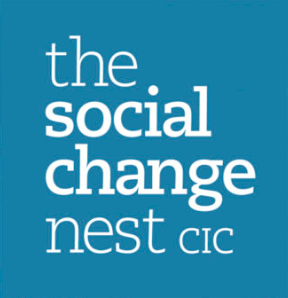Making “risky” business our business
Bridging the gap between funders and the needs of grassroots groups
In previous blogs we have talked about the need for grassroots movements vs. funder’s resistance to risk, and questioned the meaning of the word in this context. Next in our exploring risk in funding series, we wanted to look at the role that we, The Social Change Nest, play in all this. How do we make sure that we’re walking the walk as opposed to just talking the talk?
It is clear that there is a disconnect between how risk is perceived by funders and the reality of what it looks like for communities. The panellists from our Risky Business event have already said it better than I could, so I’ll pass the metaphorical mic over to them:
“Everyday people in communities are balancing bigger risks than you’ve ever considered” – Caroline Mawer, Camden Giving
“It’s absurd that funders are holding grassroots organisers to account when they are held to account by their own communities.” – Jo Wells, various social sector advisory roles
What came up when we surfaced this conversation was that there needs to be a change of mindset. Instead of asking ‘what is the risk of giving this money,’ funders need to be asking themselves, ‘what is the risk of not giving this money?’
As another of our panellists Nonhlanhla Makuyana (Decolonising Economics) said, “giving a little bit doesn’t create the sustainability needed to build strong movements that take us to the future we want to get to.” If we believe in funding grassroots groups, having seen the important role they play in social change, we need to be giving enough resources for them to not only survive, but thrive.
To get there, we need something to bridge the gap between where the funders are, and the needs of grassroots groups. This is where The Social Change Nest comes in. Our deep understanding of the two sides has allowed us to build frameworks and services to help navigate this disconnect. Acting as a kind of ‘social change scaffolding’, we aim to offer services that close the gap between funders and grassroots groups, whilst sharing the resources and advocating for longer-term systemic change.
In addition to holding spaces for discussion such as our Risky Business event, we are guiding funders through processes to enable a smooth transition to embracing risk. We also offer vital support to grassroots groups to enable them to build out the capacity needed so they are ready to thrive as they get the funding they so deserve.
social change is slow and takes time – well, less time if you fund the grassroots groups and movements at the forefront of social change
Supporting funders through this change process makes it an easier shift for them to fund grassroots organisations directly in the future – we are playing the long game here. After all, true social change is slow and takes time – well, less time if you fund the grassroots groups and movements at the forefront of social change…
Much like any kind of scaffolding, the end goal is for us to step away, take the temporary structure down, and find behind two well-connected metaphorical buildings – one representing the funders, and the other the communities they serve. In the meantime, we’ll be here talking to and guiding funders and empowering and strengthening community groups.
Grace Sodzi-Smith,
Partnerships Manager at The Social Change Nest
A solution enabling funders to fund movements, networks and changemakers
Don’t let bureaucracy become the oppressor. At the core of The Social Change Nest, is a desire to provide a solution which enables funders to be able to fund movements, networks and changemakers without adding to their problems.
All of the funders we work with see the value in community led change. They approach us wanting to find a way to send funding to grassroots groups that involves minimal administrative work for the groups and allows them to work with the funding in a way that suits them.
Funders come to us frustrated with their internal systems and we step in to lift this barrier
However, some of the funders we work with come to us in a position where their current way of distributing funds involves navigating a heavily bureaucratic system of getting funding signed off. The systems that a lot of funders work within limit the pace at which they can deliver funds to grassroots groups in the timelines that the groups need it. This then causes missed opportunities for grassroots groups to receive the funding at all which, you might say, defeats the point.
Funders come to us frustrated with their internal systems and we step in to lift this barrier. We do this in part, by providing the opportunity for groups to be fiscally hosted by us on the Open Collective platform, where they can see and manage their funding transparently and collaboratively.
Granting to grassroots groups inherently involves microgranting, which is more admin than managing bigger grants, and a lot of funders don’t (yet) have the infrastructure or the time to invest in building the systems to navigate it. We enable funders to distribute small grants at a quicker rate than big grants, which tend to happen once in a blue moon. This then means grassroots groups get to work continuously as opposed to waiting for ages to get started and so potentially losing out on taking on time-bound projects.
funding doesn’t have to involve a series of hierarchical hurdle jumps
Transparency, trust and communication is central to our process; we build relationships with both funders and groups so that everyone involved understands what our process is and can feel supported throughout. This helps to demystify the world of funding and receiving grants by both showing groups how they can manage their funding easily and transparently, and also showing funders that funding doesn’t have to involve a series of hierarchical hurdle jumps. Funding then emerges as something much more doable and in their control than both sides had originally thought.
In evaluating our impact, we found that 80% of funders* said working with The Social Change Nest has encouraged them to make deeper shifts to their funding policies or models. Lankelly Chase are one of these and have changed their policies through their board. Joe Doran reflected on this by stating “It’s been heartening, and heartbreakingly obvious, to see how changing the plumbing of funding (the ancient, fixed and hidden pipework that dictates flow and direction and was built by people removed from current realities) has allowed capital to be redistributed in different ways to different groups”.
It has demonstrated how out of touch, unfit for purpose and power hungry the philanthropic world
He goes on to say that “this is one of the great and enduring benefits of The Social Change Nest. The shadow side is that The Social Change Nest highlights how much of an irredeemable failure the current system is. It has demonstrated how out of touch, unfit for purpose and power hungry the philanthropic world is that it has to find workarounds to its own processes.”
Despite all of the work we are doing to try to alleviate the risk for funders and to bridge the disconnect in more specific ways, it is also important to remember that this is a temporary solution to an issue that is dynamic and what should be considered as part of examining how power and controls flows through ‘resource’ (money, time people) management. This is why creating spaces such as Risky Business are so important and highlights the ever-crucial need to continue to learn together.
*who responded to the survey
Becca Bolton,
Project Manager at The Social Change Nest
If you’re interested in learning more about getting funding to grassroots groups, email us at hello@thesocialchangenest.org.

At The Social Change Nest, we’re radically transforming the funding landscape. We nurture grassroots groups and enable funders to support frontline social action.
As a community interest company (CIC), we’re the non-profit sister to The Social Change Agency.
In 2022 we were honoured to have The Social Change Nest listed among the Top 100 Social Enterprises in the UK.
Our vision is to build a vibrant and thriving civil society where social change happens from the ground up and the power to create change is open to all.
originally published at The Social Change Agency
featured photo by Sammie Chaffin on Unsplash

Network Weaver is dedicated to offering free content to all – in support of equity, justice and transformation for all.
We appreciate your support!
